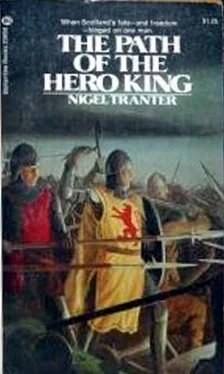Clifford! Bruce cried, chokingly.
Robert Clifford, fore God!
And then more quietly, Aye-before God, at last! May He have mercy
… on his soul! May he … rest in peace. The King had made many
merciful pronouncements of late. But this was as hard a sentence to say as any he had ever enunciated.
He turned blindly away, as William Lamberton gripped his
Chapter Twenty-two
In the refectory of the Abbey of Cambuskenneth, almost is landed in a
great bend of the Forth only a mile or so north of the battlefield,
Robert Bruce played a new role, armour, weapons and the panoply of war
for once cast aside. He sat at a table, with the Abbot Bernard, his
Chancellor, and other clerks who yesterday had been soldiers, and was
flanked by other tables manned by monks and priests, even of high
degree-any who could write and figure on paper. And all around them
men came and went, bringing, stacking, piling high, arranging,
documenting the greatest treasure Scotland had ever seen. When the
King of England went to war, it seemed, he did so in style-and in his
haste to be gone, he had left his style behind. Cambuskenneth had
become a counting house
Gold and silver vessels and plate, personal jewellery, gem studded ceremonial weapons, crosses, orders and the like, gold worked clothing, saddle-cloths, standards and banners, rich harness, was the last of it even though there were over 200 pair of knights golden spurs alone. It was the armour, helmets and shields, much of it gold-and silver-enriched, captured or cast away by fleeing men, that half-filled the hall. King Edwards own shield, even his royal seal, lay on the table at Bruces elbow.
The King yawned nevertheless. He was not much of an accountant-although none recognised better what this wealth meant to bankrupt, war-ravaged, all but starving Scotland. He had in fact slept no more that night than the nights before-though on this occasion he had been conducting a knights vigil, in the Abbey chapel, over the body of Gilbert de Clare, of Gloucester, his cousin, a vigil and personal thanksgiving combined. Few, indeed, had slept much anywhere in Scotland that night, save for the drunken-the bells had seen to that. Every bell in the land had been ringing since nightfall-and not all were so mellow and harmonious as the great carillon of Cambuskenneth which even yet kept the warm noontide air throbbing around them. The jangle from nearby Stirlings host of belfries across the river was head-splitting, nerve-shattering, and dearly the King would have liked to command its cessation-but did not. I calculate the treasure already listed now at worth no less than 200,000, Sire, Bernard de Linton mentioned, pen pausing for a moment.
Aye. No doubt, the King conceded.
Very good. A great sum.
But-this is not a cattle-mart! Do you have me here to price and sum?
He yawned cavernously.
Your Grace, the Abbot said severely.
Here is new life for your kingdom. Yesterday we shed sweat and blood. Here is lifes blood of a different sort. But a sort that the realm must have.
I know it, friend. Know also that to you, as Chancellor, this is allimportant. But for myself, I am more concerned to hear the figures of our losses yesterday, which still you do not find for me.
It takes time, Sire. Until the Lord Edward comes back. And Sir James, with the Marischal. And Sir Neil, and the others, pursuing the enemy. We cannot know for sure. Even bodies counted are no sure token. For who can tell a Scots corpse from an English, sunk in mire? Stripped. Drowned in Forth. But-comfort Your Grace-we believe that our losses are small, as against those of the English. In dead. Even in wounded. Of these, they say there are more men injured by their own splintered pike-staffs than by enemy steel. Of knights we do know numbers. But three are dead.
Sir William, younger son of the Earl of Ross. Sir William de Vipont. And Sir William Airth. Only these, though more are wounded. Against already counted thirty-five English barons and nobles, over 200 knights and 700 esquires and gentry. Dead. So great a victory is scarce believable …
There was an interruption. A small party of Islesmen came into the hall, pushing before them a white-haired elderly man dressed only in bloodstained silken shirt and breeches, his fine features lined with pain and fatigue. Yet this man, though roughly handled, still clutched a sword to him, determinedly though not aggressively.
After a word with the guard at the door, the little party was permitted to approach the King.
Lord, their spokesman said, in the soft Gaelic, this man we have but now found. In a bush. He says that he will yield his sword to none but you. He said we could kill him before he gave it up.
Almost we did …
Enough of this heathen gibberish! the old man interrupted strongly, for so frail-seeming a captive.
I am Marmaduke Tweng. Will Your Majesty accept my sword?
Ha! Sir Marmaduke! Bruce actually rose to his feet.
I greet you, sir. Yours is a name all men would honour. You are
hurt? Honour …? the other demanded.
Is there honour for any Englishman hereafter? Our honour is fled!
Better that it was trampled in yonder mire!
Not so, sir. Honourable men do not lose their honour so easily.
Because others forget theirs. Yours is safe, I say. It came intact from Stirling once before!
Sir Marmaduke Tweng was, in fact, one of the very few notable Englishmen who had come out of Wallaces campaigns, especially the Battle of Stirling Bridge, seventeen years before, with name unsullied even though he had held Stirling Castle against the Scots for long years thereafter. Wallace had said that if there were but a few more Twengs in England, Scotland would never win her freedom.
Aye-this foul corner of Scots mire has been the curse on me! I say, the curse of me. He had to shout, above the clamour of the bells.
King Robert-will you accept my sword?
That I will not, Sir Marmaduke! Keep your sword. No man wears one more worthily. You are no prisoner. So you pay no ransom. Bruce turned to the Chancellor.
Give these MacDonalds something for their trouble. A gold spur perhaps. And let them go.
You, Sir Marmaduke, may not have lost your honour or your sword-but you have lost much, I see. Blood, it seems-and armour, helmet, mount, shield, seal? See you-take what you will from here. He waved a hand at all the stacked booty.
And choose you a horse. Moreover, show yourself to my physicians. You are my honoured guest until you leave this Scotland.
The older mans voice quavered now, and was barely to be heard above the bells.
You are kind. Noble. There speaks a king indeed! He coughed, to hide his emotion.
Would … would we had such a king, in England. May I… kiss your Majestys hand?
He raised his white head.
One matter more, Sire-of your patience. I have a friend. Sir Edmund de Mauley. Lord Seneschal of England. Do you know …?
I fear he lies in the chapel crypt, here, sir. With … others. He at least did not flee.
And … and my cousin? Sir William, Lord of Higham? The Lord Maisbal of Ireland?
He also, Sir Marmaduke. Their honour is safe.
For that I thank God …
A disturbance turned all eyes. A gorgeously-clad figure in splendid surcoat and gold-inlaid armour was being carried in on a cot house door, a great eight-pointed cross picked out in rubies on his breast, one who had escaped the mud-but not the blood. Gilbert Hay escorted the body in. Sire-I know not who this is. None know. They found him beneath a heap of slain. But the cross, of St. John. Of Rhodes. A stranger knight. But important, I think …
Читать дальше












